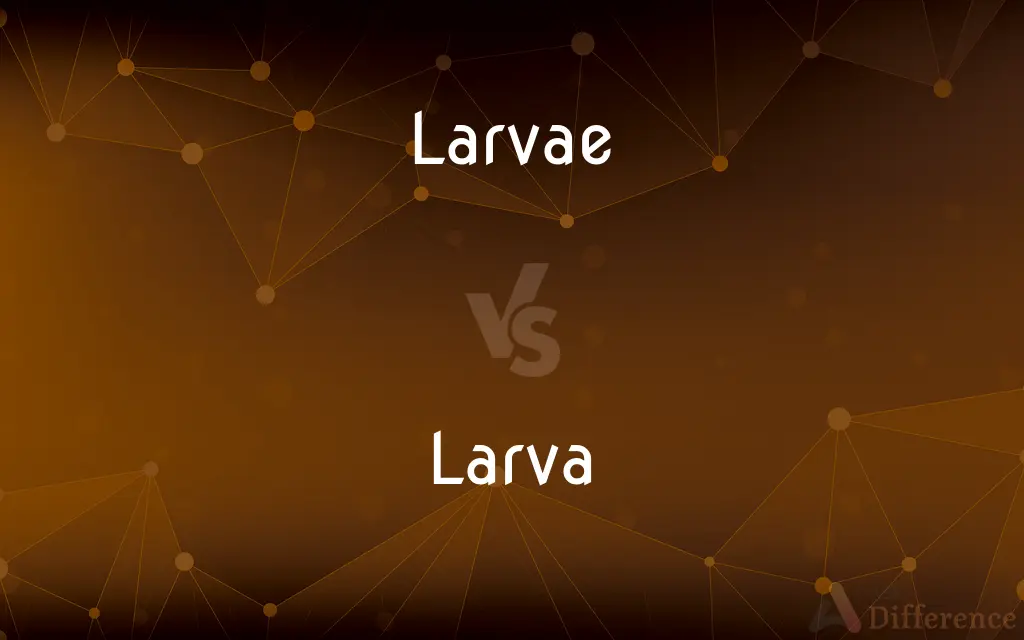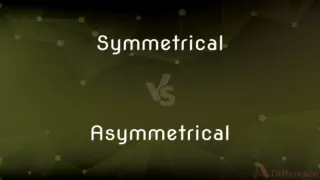Larvae vs. Larva — What's the Difference?
By Tayyaba Rehman — Updated on October 19, 2023
Larvae is the plural form of larva; both refer to the immature stage of insects, preceding the adult form.

Difference Between Larvae and Larva
Table of Contents
ADVERTISEMENT
Key Differences
Larvae and larva represent different stages in the life cycle of many insects. While "larva" signifies a single individual in its immature phase, "larvae" indicates multiple such individuals.
When observing a solitary, immature insect that hasn't yet reached its adult form, one refers to it as a "larva." On the other hand, if a group of these immature insects is observed, they're collectively termed "larvae."
It's essential to use "larva" and "larvae" correctly, especially in scientific contexts. A research report might state: "The larva undergoes several molts before becoming an adult," whereas, when referring to multiple specimens, it would say: "The larvae were observed for developmental changes."
In everyday language, people might not be keenly aware of the distinction between "larva" and "larvae." However, in entomology and biology, the distinction is crucial. For instance, "The butterfly larva feeds on specific plants" versus "The larvae of many insects serve as crucial links in food chains."
While "larvae" suggests variety or abundance in terms of immature insects, "larva" highlights singularity, focusing on an individual entity.
ADVERTISEMENT
Comparison Chart
Number
Plural
Singular
Represents
Multiple immature insects
One immature insect
Usage in a Sentence
"The larvae are feeding on leaves."
"The larva is in its cocoon."
Grammatical Role
Subject/ Object for plural verbs
Subject/ Object for singular verbs
In Scientific Research
"Larvae were collected for study."
"A larva was observed under the microscope."
Compare with Definitions
Larvae
Immature stages of insects.
The garden is teeming with larvae after the rain.
Larva
The singular form of larvae.
The larva crawled beneath the leaf for protection.
Larvae
Multiple entities undergoing transformation.
The larvae will soon pupate into beetles.
Larva
An insect's immature stage before it becomes an adult.
The butterfly larva feeds voraciously on plants.
Larvae
Distinct from adult insects in behavior and appearance.
The larvae look nothing like the colorful butterflies they become.
Larva
The form that undergoes metamorphosis.
The larva will soon enter its pupal stage.
Larvae
Pre-adult forms in metamorphosis.
Butterflies begin their lives as larvae.
Larva
A larva (plural larvae ) is a distinct juvenile form many animals undergo before metamorphosis into adults. Animals with indirect development such as insects, amphibians, or cnidarians typically have a larval phase of their life cycle.
Larvae
Often the feeding stage in an insect's life cycle.
The plant's leaves are full of holes from hungry larvae.
Larva
The newly hatched, wingless, often wormlike form of many insects, developing into a pupa in species that undergo complete metamorphosis.
Larvae
The newly hatched, wingless, often wormlike form of many insects, developing into a pupa in species that undergo complete metamorphosis.
Larva
The six-legged immature form of a tick or mite.
Larvae
The six-legged immature form of a tick or mite.
Larva
The newly hatched, earliest form of any of various animals that undergo metamorphosis, differing markedly in appearance from the adult.
Larvae
The newly hatched, earliest form of any of various animals that undergo metamorphosis, differing markedly in appearance from the adult.
Larva
Roman Mythology A malevolent spirit of the dead.
Larvae
Roman Mythology A malevolent spirit of the dead.
Larva
An early stage of growth for some insects and amphibians, in which after hatching from their egg, insects are wingless and resemble a caterpillar or grub, and amphibians lack limbs and resemble fish.
Larva
An animal in the aforementioned stage.
Larva
A form of a recently born or hatched animal that is quite different from its adult stage.
Larva
(figurative) A preliminary stage of someone or something, before it has fully matured, especially a time of growth rather than one of performance.
Larva
Any young insect from the time that it hatches from the egg until it becomes a pupa, or chrysalis. During this time it usually molts several times, and may change its form or color each time. The larvæ of many insects are much like the adults in form and habits, but have no trace of wings, the rudimentary wings appearing only in the pupa stage. In other groups of insects the larvæ are totally unlike the parents in structure and habits, and are called caterpillars, grubs, maggots, etc.
Larva
The early, immature form of any animal when more or less of a metamorphosis takes place, before the assumption of the mature shape.
Larva
The immature free-living form of most invertebrates and amphibians and fish which at hatching from the egg is fundamentally unlike its parent and must metamorphose
Larva
Typically a stage where feeding is vital.
The caterpillar, a type of larva, has a huge appetite.
Larva
Morphologically different from its mature form.
It's hard to believe this larva will become a beautiful moth.
Common Curiosities
Is a caterpillar a larva?
Yes, a caterpillar is the larva stage of a butterfly or moth.
Why are larvae important to study?
Larvae provide insights into insect development, behavior, and their role in ecosystems.
How is the word "larva" pronounced?
It's pronounced as "LAR-vuh."
Do all insects have a larva stage?
Most, but not all, insects undergo a larva stage in their life cycle.
How can I use "larvae" in a sentence?
"The larvae are developing rapidly in the warm weather."
Is the term "larva" specific to insects?
Primarily, but it can also refer to immature stages in other animals like amphibians.
What's the plural of larva?
The plural of larva is larvae.
Is larva the adult stage of an insect?
No, larva is the immature stage preceding the adult form.
Can larva and larvae be used interchangeably?
No, "larva" is singular, while "larvae" is plural.
Can larvae be found in water?
Yes, many insect larvae, like mosquito larvae, are aquatic.
What comes after the larva stage in insects?
In many insects, the pupa stage follows the larva stage, then the adult form.
What's the primary function of the larva stage?
The larva stage is mainly for feeding and growth before metamorphosis into the adult form.
Are all larvae harmful to plants?
Not all; while some larvae feed on plants, others have different diets or roles.
Do larvae look similar to their adult forms?
Typically, no. Larvae often have different structures and appearances compared to their adult forms.
How long does the larva stage last?
It varies widely among species and environmental conditions.
Share Your Discovery

Previous Comparison
Sensible vs. Sensical
Next Comparison
Symmetrical vs. AsymmetricalAuthor Spotlight
Written by
Tayyaba RehmanTayyaba Rehman is a distinguished writer, currently serving as a primary contributor to askdifference.com. As a researcher in semantics and etymology, Tayyaba's passion for the complexity of languages and their distinctions has found a perfect home on the platform. Tayyaba delves into the intricacies of language, distinguishing between commonly confused words and phrases, thereby providing clarity for readers worldwide.
















































